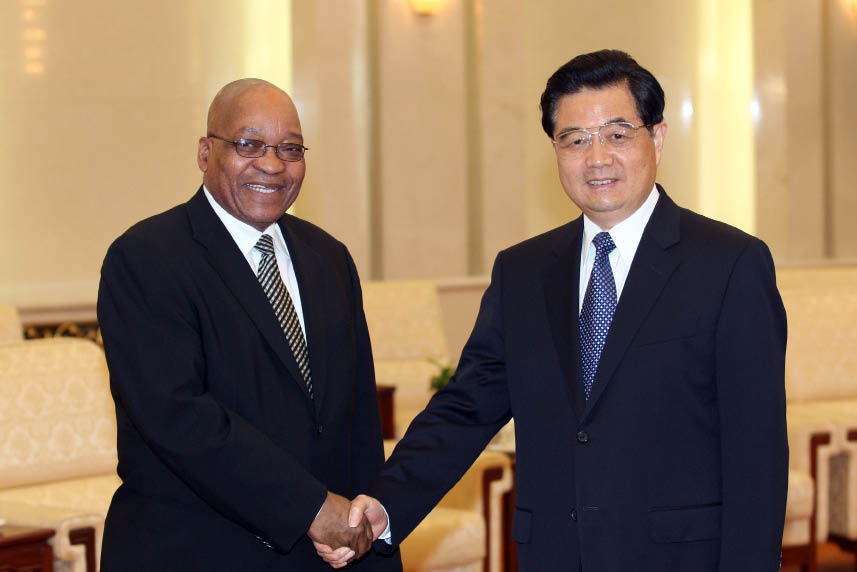Inter-party Relations Promote Sino-African Strategic Partnership
By ZHONG WEIYUN
LAST July, South African President Jacob Zuma made particular mention of the relationship between South Africa’s ruling party the African National Congress (ANC) and the Communist Party of China (CPC) at a meeting with Chinese leaders Hu Jintao and Xi Jinping. He expressed his satisfaction with the current relations, during which many senior members of the ANC have participated in training workshops run by the CPC.
This relationship is typical of that between Chinese and African political parties. It sets Africa’s relations with China apart from those it has with other powerful nations, and has strengthened the political foundations of a new kind of Sino-African strategic partnership.
 |
| President Hu Jintao meets with African National Congress President Jacob Zuma in Beijing on June 12, 2008. Cnsphoto |
Long History of Contacts
Exchanges between the Chinese and African political parties began in the 1950s. At that time, the CPC only established relations with other political parties whose ideals were rooted in communism. However, many of Africa’s national liberation organizations sent delegations to China to seek political, moral and material support and receive political and military training. Though most of these delegations were invited by China’s non-governmental organizations, it was on those occasions that they had their first contacts with departments in the CPC that were involved.
By the end of the 1970s, the CPC’s foreign policies had shifted and it started to develop relations with non-communist African parties and in particular with ruling parties. By 1988, over 40 political parties from Sub-Saharan Africa had established relations with the CPC.
In the early 1990s, a wave of multi-party democracy swept the African continent and proved a setback for Sino-African inter-party exchanges. After years of sustained communications, many of the long-reigning parties with which China had invested much time and energy developing relationships were replaced.
The new ruling parties had little understanding of the CPC, and Sino-African inter-party exchanges experienced a low ebb. In the mid-1990s African political parties once again became interested in contact with the CPC, and it successively established relations with a batch of new African political parties.
Contacts have been growing even faster in the 21st century as many African countries have become more and more stable, and these nations’ political parties have the increasing desire to work with the CPC. The momentum of bilateral party relations has been good, and to date the CPC has established relations with 81 African parties both in and out of power.
- China’s Diplomatic Strategy and Foreign Relations
- CPC Reaches Out to Political Parties in the Developed World
- CPC’s Relations with Political Parties in Latin America
- Inter-party Relations Promote Sino-African Strategic Partnership
- Changes in China that Amount to Revolution – Former Peru President Alan García Pérez on China’s Progress
Services
Economy
- Eco-agriculture and Eco-tourism Power Nanchang’s Green Development
- Balance Environmental Protection and Economic Prosperity – Nanchang Looks to European Technology for Green Development
- Sustainable Growth Requires Wiser Energy Use
- Chinese Economy: On the Path of Scientific Development
- China's Economy over the Last Ten Years

